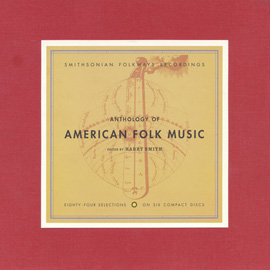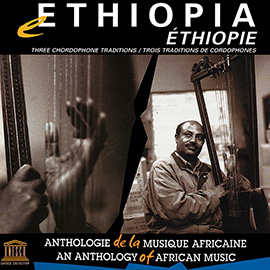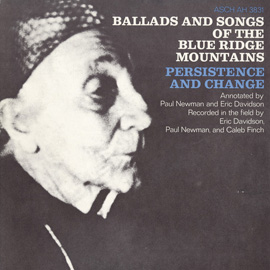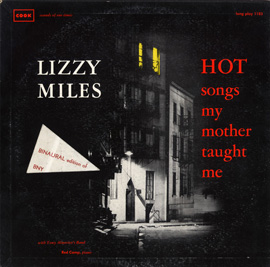-
Folkways Fast Five: Nathan Katkin
Fast Five is a speed-interview that asks Smithsonian Folkways Recordings staff five questions about the collection.
Welcome to the very first edition of “Fast Five”, where we at Smithsonian Folkways Recordings take aside a member of the staff and ask them about their favorite parts of the Folkways collection. I’m here today with a fellow intern—Nathan, can you introduce yourself?
Hi, my name is Nathan Katkin and I’m an intern here at Folkways. I’m also a classics student at Columbia University and a DJ for WKCR.
What was your first Folkways album?
 The first Folkways album I ever heard was The Anthology of American Folk Music, which my parents would play in the car when I was a really little kid, and my favorite song was “King kong kitchie kitchie ki-me-o,” probably because it’s a very easy song for little kids to sing along to in the car.
The first Folkways album I ever heard was The Anthology of American Folk Music, which my parents would play in the car when I was a really little kid, and my favorite song was “King kong kitchie kitchie ki-me-o,” probably because it’s a very easy song for little kids to sing along to in the car.What are your current favorite Folkways albums?
 My two favorite Folkways albums currently are Ethiopia: Three Chordophone Traditions from the UNESCO Collection of Traditional Music and Ballads and Songs of the Blue Ridge Mountains: Persistence and Change, which is an old Folkways release of American folk music.
My two favorite Folkways albums currently are Ethiopia: Three Chordophone Traditions from the UNESCO Collection of Traditional Music and Ballads and Songs of the Blue Ridge Mountains: Persistence and Change, which is an old Folkways release of American folk music.Why are those your favorites?
The Ethiopian one I like because it combines Ethiopian ethnic folk traditions—songs from the tribes and origin stories and myths—and it combines those with books of proverbs and Christian wisdom. So they get a lot of floating-verse-type things from these books, and they recombine them in different ways every time they sing the song. So each performance of the song is different, and interweaves the different identities at work in the singer in different ways every time it’s sung.
 I guess I like the Appalachian album for some of the same reasons. It sort of captures panoramically both the a cappella ballad tradition, which is really powerful in Appalachia, and the string band dance tradition. Both of those do kind of have that element of floating verses—in the ballads, it’s actually less floating verses because there’s more narrative, and in the string band one, you get kind of a social music where the singer will just sing whatever comes to their mind in the moment as they’re singing the song. I think putting those things side-by-side is very powerful, because you get the full scope of how the music interacts with the peoples’ lives, whether they’re telling stories that they feel they can refer to in their own lives or whether they’re playing social music that they dance to and have a good time. It’s also good sonic variety, because there’s a cappella and very instrumental music.
I guess I like the Appalachian album for some of the same reasons. It sort of captures panoramically both the a cappella ballad tradition, which is really powerful in Appalachia, and the string band dance tradition. Both of those do kind of have that element of floating verses—in the ballads, it’s actually less floating verses because there’s more narrative, and in the string band one, you get kind of a social music where the singer will just sing whatever comes to their mind in the moment as they’re singing the song. I think putting those things side-by-side is very powerful, because you get the full scope of how the music interacts with the peoples’ lives, whether they’re telling stories that they feel they can refer to in their own lives or whether they’re playing social music that they dance to and have a good time. It’s also good sonic variety, because there’s a cappella and very instrumental music.What do you think you would call the “hidden gem” of the collection?
 Well, I think the biggest hidden gem is the Cook Records collection, which is an entire set of records that Folkways acquired, that were made by a man named Emory Cook, who was kind of a mad scientist who decided he was going to record as many different things as possible with the highest fidelity audio possible, and he used a lot of very strange technologies to record things. I think the real hidden gem of that collection is a blues singer named Lizzie Miles, who performed in New Orleans primarily—she tried moving away for a little bit but she didn’t like it, and she quit music a couple times for religious reasons, but then would always end up singing the blues again. She didn’t make that many recordings; there were a couple 78s but they’re hard to come by. Emory Cook did two albums of very hi-fi recordings of her doing her blues songs, and they’re totally fantastic. I think the one to pick is Hot Songs My Mother Taught Me, a pretty great album in the Folkways catalogue that I think gets a little underappreciated.
Well, I think the biggest hidden gem is the Cook Records collection, which is an entire set of records that Folkways acquired, that were made by a man named Emory Cook, who was kind of a mad scientist who decided he was going to record as many different things as possible with the highest fidelity audio possible, and he used a lot of very strange technologies to record things. I think the real hidden gem of that collection is a blues singer named Lizzie Miles, who performed in New Orleans primarily—she tried moving away for a little bit but she didn’t like it, and she quit music a couple times for religious reasons, but then would always end up singing the blues again. She didn’t make that many recordings; there were a couple 78s but they’re hard to come by. Emory Cook did two albums of very hi-fi recordings of her doing her blues songs, and they’re totally fantastic. I think the one to pick is Hot Songs My Mother Taught Me, a pretty great album in the Folkways catalogue that I think gets a little underappreciated.Why are you working here this summer?
Well, I DJ at WKCR during the school year, and I’m also a Classics major. The common thread between those two things, and I think also the common thread that brought me to Folkways, is that I have a big interest in cultural stewardship and in preserving the culture of the past. I think that we have a responsibility to make sure that nothing is ever forgotten, in the huge store of cultural capital that humans have built up for a long time. There’s always new and wonderful culture being produced, and that’s a great thing, and there’s lots of underrepresented voices in the culture that is currently being produced that deserve attention. However, I think that one thing that people don’t often think about is that the past is hugely underrepresented in the culture we consume every day, because it already happened and people don’t care to think about it.
So even though the Classics have this kind of omnipresence in being the foundation of literature, the thing that influenced everything, very few people actually go back and read Vergil or Homer or lesser-known classical poets like Sappho or Catullus, and I think it’s very important to get those voices back out there.
I feel the same way about Folkways—this music has been recorded, we have these huge collections, and a lot of it’s never really been heard. I think that the same obligation that I feel to the past that brought me to Classics and brought me to play this music on the air at WKCR brought me to Folkways, where I think we do a lot to get this music out to the people. It’s a beautiful thing.
Folkways Fast Five: Nathan Katkin | Smithsonian Folkways Recordings

